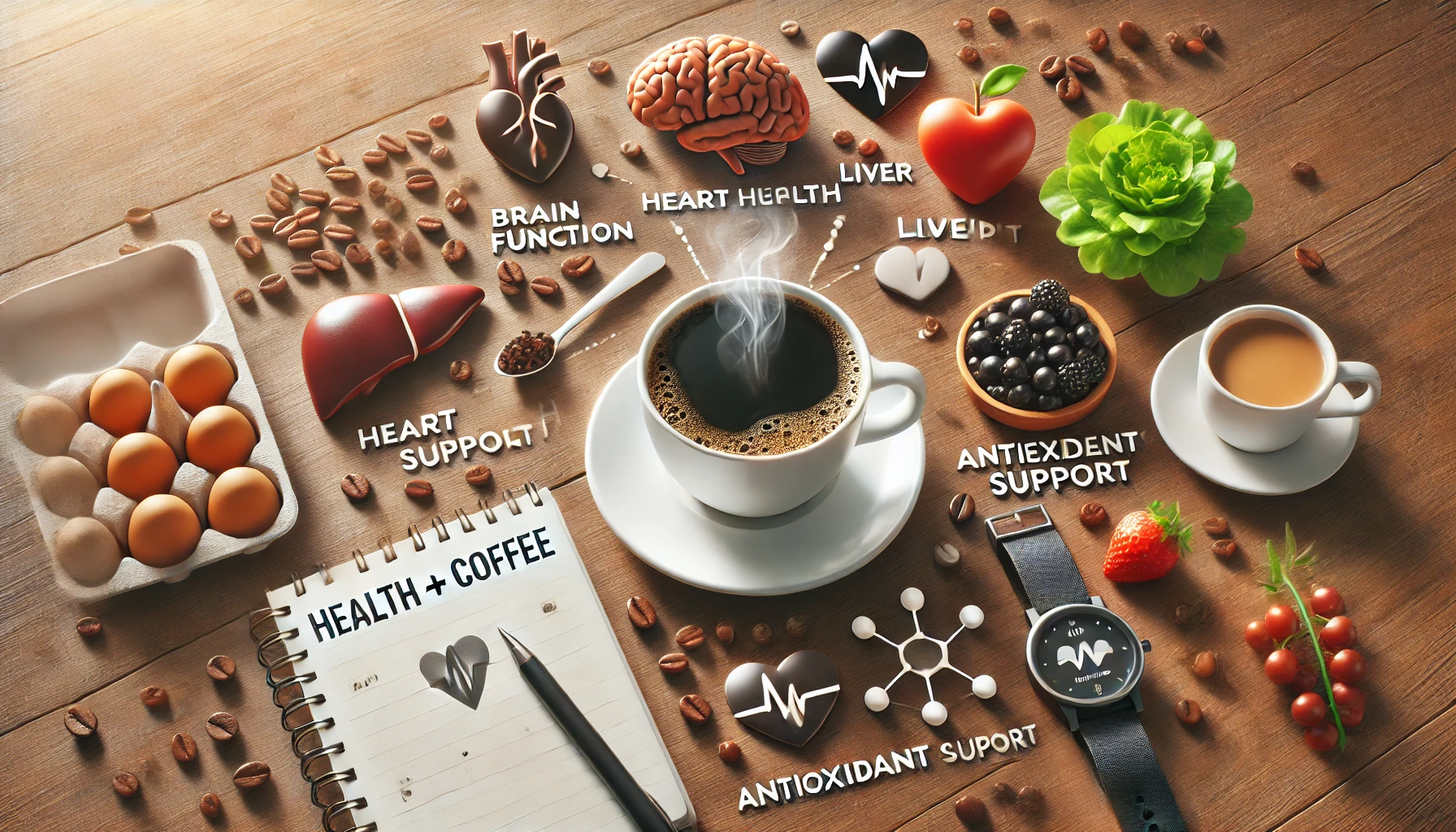Coffee isn’t just a delicious way to start your day—it’s also one of the most studied beverages in the world when it comes to health. And the good news? Research shows that coffee, when consumed in moderation, can offer a wide range of science-backed health benefits.
In this article, we’ll explore how coffee may support your brain, heart, liver, metabolism, and more—plus a few tips to make your daily cup even healthier.
Coffee: More Than Just Caffeine
Yes, coffee contains caffeine, a natural stimulant—but it’s also packed with:
- Antioxidants (like chlorogenic acid)
- Polyphenols that help fight inflammation
- Essential nutrients like B vitamins, potassium, and magnesium
- Natural compounds with antimicrobial, anti-aging, and neuroprotective effects
The combination of these compounds gives coffee its potential to protect, energize, and restore the body in multiple ways.
1. Boosts Brain Function and Mood
Caffeine blocks adenosine, a neurotransmitter that makes you feel tired. This leads to:
- Improved alertness and concentration
- Enhanced short-term memory
- Faster reaction times and mental clarity
- A reduced risk of depression and cognitive decline
Research:
- A 2021 study published in Nutrients linked moderate coffee intake to a lower risk of Alzheimer’s and Parkinson’s disease.
- Another study found that coffee drinkers had a 33% lower risk of depression than non-drinkers.
2. Supports Metabolism and Fat Burning
Caffeine stimulates the central nervous system, increasing the release of adrenaline and encouraging fat cells to break down.
Benefits include:
- Slight increase in metabolic rate
- Improved physical performance during workouts
- Potential aid in appetite suppression
This is why caffeine is a key ingredient in many commercial fat-burning supplements.
3. Protects the Liver
Coffee may be one of the best beverages for your liver health.
Regular coffee consumption is linked to:
- Lower risk of liver cirrhosis (especially alcohol-related)
- Reduced markers of liver inflammation
- Lower risk of non-alcoholic fatty liver disease (NAFLD)
- A protective effect against liver cancer
Three or more cups per day seem to have the most benefit, especially unsweetened, black coffee.
4. Reduces Risk of Type 2 Diabetes
Several large studies suggest that coffee drinkers have a lower risk of developing type 2 diabetes.
How?
- Improves insulin sensitivity
- Reduces oxidative stress and inflammation
- May enhance glucose metabolism
Even decaf coffee appears to offer benefits, suggesting compounds beyond caffeine play a role.
5. Heart Health Support
Contrary to old myths, moderate coffee intake is not harmful to your heart—and may even be beneficial.
Potential benefits include:
- Lower risk of stroke and heart failure
- Slightly reduced risk of coronary artery disease
- No significant increase in arrhythmia risk for most people
Important:
People with hypertension or caffeine sensitivity should monitor their intake and consult with a healthcare provider.
6. Rich in Antioxidants
Coffee is one of the leading sources of antioxidants in the average diet—especially for people who don’t eat many fruits and vegetables.
Antioxidants in coffee help:
- Fight free radical damage
- Reduce inflammation
- Support cellular repair and longevity
In fact, coffee contains more antioxidants than green tea or cocoa, depending on the roast and origin.
7. May Help You Live Longer
Several studies have found an association between coffee consumption and lower risk of death from various causes, including:
- Cardiovascular disease
- Neurological diseases
- Certain cancers
- Respiratory disease
While not a magic elixir, coffee appears to be a marker of a health-conscious lifestyle and may contribute to increased longevity when consumed wisely.
How to Maximize Coffee’s Health Benefits
- Drink it black or with a splash of milk—avoid heavy sugar and cream
- Choose quality beans, ideally organic and freshly roasted
- Don’t drink it too late in the day—it may disrupt sleep
- Stick to 2–4 cups per day for most people
- If you’re sensitive to caffeine, try decaf or lower-caffeine beans
Who Should Be Cautious?
- Pregnant or breastfeeding individuals: Limit to ~200mg of caffeine per day
- People with anxiety or insomnia: May be sensitive to stimulant effects
- Individuals with GERD or acid reflux: Try cold brew or low-acid beans
- People with certain heart conditions: Consult with a doctor before increasing intake
Final Thoughts: A Healthy Brew with a Bonus
Coffee isn’t just a daily habit—it’s a health-promoting drink when enjoyed in moderation. With antioxidant power, brain-boosting benefits, metabolic support, and protective effects for the liver and heart, coffee can absolutely be part of a healthy, vibrant lifestyle.
So sip with intention, skip the syrup, and know that your favorite ritual might be doing more for you than you thought.
